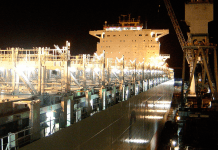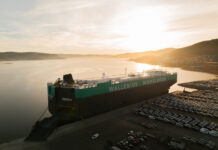
ClassNK has published estimated leak frequencies for ammonia fuel from onboard components of ammonia-fuelled ships, providing valuable data for risk assessment.
These estimates are included in ‘Part C of Guidelines for Ships Using Alternative Fuels (Edition 3.0)’ as an appendix.
Ammonia is gaining attention as a potential alternative fuel for ships due to its zero CO2 emissions when burned, and various studies and developments are underway to bring ammonia-fuelled ships into practical use.
A key aspect of designing such ships is conducting a risk assessment, which involves evaluating the likelihood of ammonia leaks from each component. However, due to the limited statistical data on onboard ammonia leaks, estimating these probabilities has been challenging.
To address this, ClassNK collaborated with the Research Institute of Science for Safety and Sustainability (RISS) at the National Institute of Advanced Industrial Science and Technology (AIST) to estimate the probability of ammonia leaks.
They employed a Bayesian method, combining data from Japan’s onshore ammonia leak frequency database, provided by the High-Pressure Gas Safety Institute of Japan, with LNG leak frequency data from LNG-fueled ships.
This approach, which is particularly useful for substances with limited operational data like hydrogen, marks the first-ever estimation of ammonia leak frequencies in onboard components for ammonia-fuelled ships.
Using these estimated leak frequencies will enable more accurate and reliable risk assessments for ammonia-fuelled ships. As part of its ‘ClassNK Transition Support Services,’ which helps clients transition smoothly to zero-emission operations, ClassNK remains committed to promoting the safe use of ammonia and other alternative fuels.





